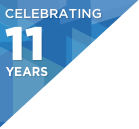Conference: Nov 5-7, 2018
Workshops: Nov 8–9, 2018
Presentation: $200 Self-Driving Cars With RasPi and Tensorflow
Share this on:
What You’ll Learn
- How to use video and user inputs to clone human behavior.
- That you want to go and build your own autonomous car!
Abstract
We (Will and Adam) will start by actually building and driving the $200 open source self driving Donkey Car. You’ll learn about the hardware components and software(python) that let it drive, capture data, and create autopilots.
Next, we’ll show you the autopilots that have been winning recent DIY Robocar races. This will give you an intuition about the constraints of self driving on cheap hardware and how to leverage cloud services to overcome them.
Lastly we’ll talk about where this project is going and how you and your kids, can help us get to the self driving future faster.
Buy car parts (see donkeycar.com for a list) before the conference, we’ll give you the 3D printed frame.
Interview
William: I really want to make it easy for people to contribute to self-driving technology, because I want to never have to drive again.
Adam: It’s a fun project, it gives you intuition and introduction to machine learning, It’s a positive environment and a fun thing.
Adam: Anyone who is interested in machine learning, people who are doing machine learning but don’t have intuition of the cause and effect of model building, Python programmers, people who like cars, people who have done RC (remote control) cars in the past and are ready for the next level.
William: Anyone who wants to try teaching machines rather than programming them.
William: One thing would be how do you use a video and user input stream to train a neural network to “clone” a user's behavior.
Adam: I think everyone is going to want to come out of this wanting to build a car. It’s a cool project. People can take the off-the-shelf design and get it going in a few hours then improve it make it better.
Will: One package in the car software will change that causes a bug that will take lots of time to find and fix. The things I enjoy staying up late thinking about about are, how do we a car that can be trained by someone that doesn’t know how to code. Right now our autopilots drive a bit like a disobedient 3 year old would. Now all we need is a little discipline.
Similar Talks



.
Tracks
-
Architectures You've Always Wondered About
Architectural practices from the world's most well-known properties, featuring startups, massive scale, evolving architectures, and software tools used by nearly all of us.
-
Going Serverless
Learn about the state of Serverless & how to successfully leverage it! Lessons learned in the track hit on security, scalability, IoT, and offer warnings to watch out for.
-
Microservices: Patterns and Practices
Stories of success and failure building modern Microservices, including event sourcing, reactive, decomposition, & more.
-
DevOps: You Build It, You Run It
Pushing DevOps beyond adoption into cultural change. Hear about designing resilience, managing alerting, CI/CD lessons, & security. Features lessons from open source, Linkedin, Netflix, Financial Times, & more.
-
The Art of Chaos Engineering
Failure is going to happen - Are you ready? Chaos engineering is an emerging discipline - What is the state of the art?
-
The Whole Engineer
Success as an engineer is more than writing code. Hear inward looking thoughts on inclusion, attitude, leadership, remote working, and not becoming the brilliant jerk.
-
Evolving Java
Java continues to evolve & change. Track covers Spring 5, async, Kotlin, serverless, the 6-month cadence plans, & AI/ML use cases.
-
Security: Attacking and Defending
Offense and defensive security evolution that application developers should know about including SGX Enclaves, effects of AI, software exploitation techniques, & crowd defense
-
The Practice & Frontiers of AI
Learn about machine learning in practice and on the horizon. Learn about ML at Quora, Uber's Michelangelo, ML workflow with Netflix Meson and topics on Bots, Conversational interfaces, automation, and deployment practices in the space.
-
21st Century Languages
Compile to Native, Microservices, Machine learning... tailor-made languages solving modern challenges, featuring use cases around Go, Rust, C#, and Elm.
-
Modern CS in the Real World
Applied trends in Computer Science that are likely to affect Software Engineers today. Topics include category theory, crypto, CRDT's, logic-based automated reasoning, and more.
-
Stream Processing In The Modern Age
Compelling applications of stream processing using Flink, Beam, Spark, Strymon & recent advances in the field, including Custom Windowing, Stateful Streaming, SQL over Streams.
-
Performance Mythbusting
Real world, applied performance proofs across stacks. Hear performance consideratiosn for .NET, Python, & Java. Learn performance use cases with OpenJ9, Instagram, and Netflix.
-
Tools and Culture: What's Beyond a Stack of Containers?
Containers are not just a techology. It's a platform. Push your knowledge.
-
Web as Platform
All things Browser, from JavaScript Frameworks for animation and AR / VR to Web Assembly and from protocol work to open standards evolution.
-
Beyond Being an Individual Contributor
Beyond being an individual contributor. Building and Evolving managers and tech leadership.
-
Building Great Engineering Cultures
Why engineering culture matters. Track features org scaling, memes as a culture tool, Ally skills, and panels on diversity / inclusion.
-
Hardware Frontiers: Changes Affecting Software Developers Today
Topics around: Quantum computing, NVM, SMR, GPU, custom hardware, self-driving cars, and mobile hardware.











